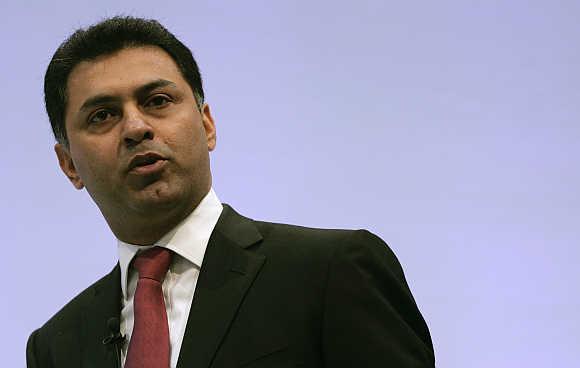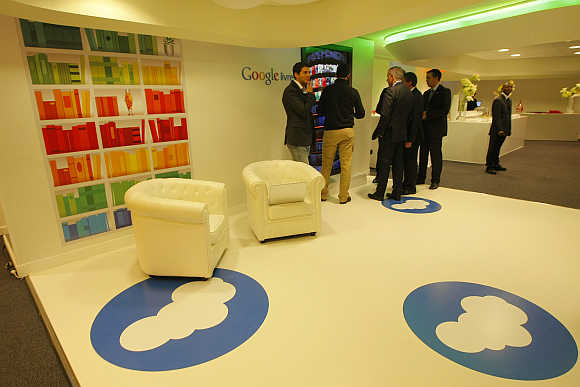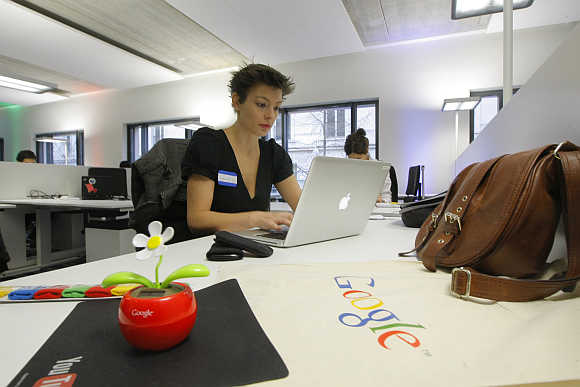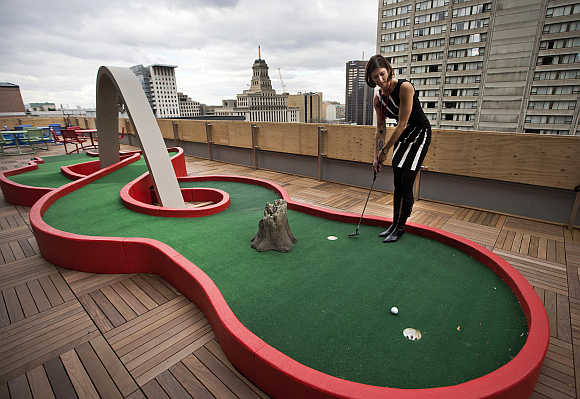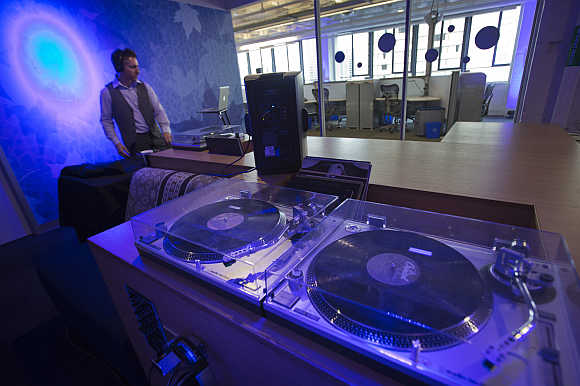 | « Back to article | Print this article |
'Books will be dead and become collectors' items'
The ace salesman on early rejections, the transition from migrants to natives in the online world and how advertisers are missing the bus
There are over 1.5 billion people on the Internet today - that means if the online community were a country, it would be the most populous one. There are two billion searches (a quarter of which are new queries) and 100 billion emails a day. And, the amount of information that was stored in just one year (2011) was 50 times more than what was created in the entire history of mankind.
Yet, Nikesh Arora says you have seen nothing yet, writes Shyamal Majumdar.
That's because the online world is moving fast from migrants to natives, making net connectivity a "must-have" from "nice-to-have" just five years ago.
"People like you and I are migrants in this online country. But people of my daughter's generation are natives because they haven't seen a world without Google or Facebook," Arora says.
He should know.
For, as chief business officer, Arora is the fourth most important executive at Google, after founders Sergey Brin and Larry Page and Chairman Eric Schmidt. In this transition, several things that we know as of now will become extinct. His list of things that will be eaten by the Internet contains the entire media business in its current form (including television advertising, which is destined to move onto interactive networks).
Also, books will be dead and become just collectors' items.
Click NEXT to read more...
'Books will be dead and become collectors' items'
"I can see this happening with my daughter who is in the ninth standard. Earlier, her books used to come in a big box. This year, she has been given an iPad. The books come loaded with it; she does her homework and submits it online, and her teacher uses cloud to access it. Can you imagine kids of her generation ever carrying books when they join college?" he asks.
We are at the conference room of Google's office at the Maker Maxity in Mumbai's Bandra-Kurla Complex, and the flavour of the city is all around us, courtesy the office decor - bright colours, cricket, dabbawalas, Bollywood and Indian fabrics.
Arora had walked in with a mug of coffee, but his colleague makes a concession for my un-Googleyness - she requests an assistant to serve coffee.
For the 44-year-old chief salesman at Google, which clocked revenue of $38 billion in 2011, the challenge is how this transition - of migrants to natives - can be managed because that will impact the search giant's revenue flow. Close to 96 per cent of Google's revenue comes from advertisements.
Most marketers, however, are still underestimating this transition, letting go of a consumer gold mine, Arora says.
Click NEXT to read more...
'Books will be dead and become collectors' items'
For example, most advertisers in India still run after television to reach eyeballs. This is reflected in the fact that India is among the few markets where traditional advertisement is still growing in double-digits.
"But this is a false sense of security. Surfing the Internet is already the second-most popular activity and the opportunities to engage this huge online community are endless," he says, adding that advertising should follow the amount of consumer time spent with a medium - that's what happened with television and radio all over the world, and that's what will happen with the Internet.
By now, I know why Arora has often been referred to as Google's "persuader-in-chief". One of his key contributions at Google has been driving revenues from other regions and building relations with advertisers.
At present, more than half the company's revenue comes from outside of the US compared to just one-third when he joined eight years ago. It's thus obvious why Google made a rare move last month, and decided to pay its top salesman $8 million in cash, instead of the previously agreed upon stock options and stock units.
Click NEXT to read more...
'Books will be dead and become collectors' items'
Arora, who made more than $23 million last year, will have to repay Google if he chooses to leave his position before April 25, 2015, the date the stock units and options will have vested. It's rare to see the extremely articulate man duck a question, but that's what Arora does when quizzed on this. He deftly shifts the topic to talk about his other aspiration - he always wanted to go to more countries than his age.
"There are more countries than the average lifespan of an individual. I think I can fulfil my aspiration," he says.
Considering that he has already visited 60 countries where Google has offices, which is 15 more than his age, this aspiration will be an easy one to achieve. All this is not bad going for somebody who faced 399 rejections before getting a job at Fidelity Investments.
"I thought life would be easy after doing my Masters from Boston and an MBA (Master of Business Administration) from Northeastern University. But here I was in an alien country - married but without a job, and living off the $3,000 that my father had sent me," Arora says.
Click NEXT to read more...
'Books will be dead and become collectors' items'
There were occasional moments of self-doubt, but the graduate from the Institute of Technology in Varanasi (now an IIT) knew he had it in him to succeed. He had by then figured out that he "might be a little smarter than he'd thought" when he beat 200,000 people to get one of the 250 scholarships on offer for engineering students in India.
Besides, in his first job at Wipro, he managed the difficult job of selling computers to government officials ("It must be still a very difficult job") - an experience that must have come in handy in his meteoric rise in many companies, including his current one.
When he joined Google, he was the first vice-president to be appointed from outside the US. Ask him about this and Arora admits he does pinch himself once in a while and attribute everything to his luck, perspiration and ability to adapt to any situation. The last skill was honed during his childhood days when he had to keep on moving every couple of years, since his father was with the Indian Air Force.
Click NEXT to read more...
'Books will be dead and become collectors' items'
Arora says he was planning to do something on his own when a friend asked him in 2004 to consider joining a company that could offer a start-up kind of an atmosphere. He remembers how the two Google founders conducted the interview among the artefacts of the British Museum.
"We walked around. We looked at the exhibits and a lot of our conversation was about the Rosetta stone," says Arora, referring to an Egyptian artefact that dates to 196 BC and is inscribed in three languages.
The Greek wording enabled scholars to decipher the hieroglyphics and was a major breakthrough in Egyptology. The three discussed how it was an amazing parallel to Google translating its services around the world. Ten days later, Arora learnt he had the job.
It was a sales job, even though he had only a year's experience in sales, and that too in India. But Chairman Schmidt had told him Google looks for people who have well-rounded skills rather than a specific one, because business will change multiple times.
True to Schmidt's words, Google has changed its business model several times, introducing new features and products, and Arora was an integral part of the change. Other than taking Google's emerging markets revenue from $1 billion to $8 billion, Arora has increased the headcount of the company.
Click NEXT to read more...
'Books will be dead and become collectors' items'
Arora, it seems, doesn't think much of the competition - whether it is Microsoft's latest Windows 8 operating system or the increasing preference of social networking platform, Facebook. He feels it's a bit harsh when the media starts comparing the Android and Windows 8 platforms and concludes that Windows 8 might provide a better opportunity for monetisation to developers (especially Indian ones).
"Windows 8 will first have to show me users, then talk about monetisation. They do not have an app philosophy," he says. As for Facebook, his take is not to overtly focus on competition. "If you look at the history of industry, your revenues are driven by your own users. If you are obsessed about someone else, a third party will come along and take away the market and disrupt the market."
As his colleague starts looking at the clock, Arora says human behaviour has remained constant through the ages; it's only the platform that has changed. "For example, earlier, people used to gossip, share notes and catch up on the latest at small gatherings in front of the ubiquitous paan ki dukan. Now, they do it on Facebook."
Before winding up, I ask him the inevitable question - what's next? At 45, he has already reached the top - well, almost - but won't he remain just the tallest pygmy in a company where the founders are much younger than him? Arora smiles and says he "does things to undo the pattern every time his life takes on a steady pattern".
But he still loves going to office every day in a company that loves disrupting conventions, and where his colleagues are always excited about solving the most complicated of technological problems. Messrs Page and Brin would indeed be proud of their ace salesman for that answer.
